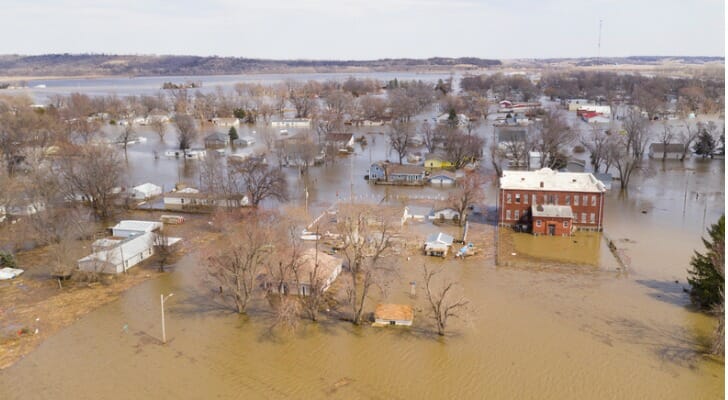When a natural disaster or man-made crisis strikes, businesses often must suspend operations or operate at reduced capacity for a time. Business interruption insurance can protect business owners against income losses in these situations. However, it doesn’t normally cover infectious diseases like COVID-19 or pandemics. Typically, for the policy to kick in, there must be damage to the business property. But as business owners learn that their losses from the coronavirus crisis aren’t covered, some states are stepping in, introducing bills that retroactively require insurers to cover these losses. These states include: Louisiana, Massachusetts, Michigan New Jersey, New York, Ohio, Pennsylvania and South Carolina – plus Washington, D.C. In this article we’ll discuss what typically is and isn’t covered by business interruption insurance.
Many financial advisors specialize in working with business owners. Find a financial advisor today.
What Is Business Interruption Insurance?
Business interruption insurance is a type of coverage that can be added onto a commercial property insurance policy. It may also be included in a commercial package policy. This type of coverage is not sold separately.
Business interruption insurance provides extra coverage in addition to policies protecting against damage to property caused by perils such as fire and windstorms. It can help businesses replace lost income and cover the extra expenses created when disaster strikes.
Among the losses interruption insurance can compensate businesses for are lost revenue, rent and lease payments, mortgage payments, other loan payments and taxes. Employee payroll may be covered, along with costs of having to relocate temporarily or permanently to new premises. (The recently enacted CARES Act, a stimulus package, provides relief to small businesses for some of these costs.)
When Business Interruption Can Help
Compensation under a business interruption policy is triggered when the business must vacate its normal premises due to disaster-related damage covered by the property insurance policy. Fire, for instance, is normally covered by these policies.
This sort of coverage can be very important for businesses impacted by disasters, especially ones with major economic shocks. It can help them start back up quickly after the event is over, avoiding losing business to competitors and otherwise maintain operational continuity. Unfortunately, there are many potential disasters that aren’t likely to be covered by business interruption insurance.
What Is and Isn’t Covered
 A disaster, such as a hurricane, that inflicts financial damage on physical property is most likely to be covered by business interruption insurance. Fires and destructive winds are risks often covered by commercial property and, therefore, are likely to be covered by many business interruption policies.
A disaster, such as a hurricane, that inflicts financial damage on physical property is most likely to be covered by business interruption insurance. Fires and destructive winds are risks often covered by commercial property and, therefore, are likely to be covered by many business interruption policies.
Other risks are less likely to be covered. For instance, in addition to causing loss of life, a pandemic can be very costly to businesses by disrupting supply chains, causing employees to miss work because of illness, keeping customers from shopping due to quarantines and more. But, while their impact in human terms can be tremendous, pandemics don’t cause property damage resulting in income loss. They sicken people, but don’t directly harm property. So pandemic-related losses are not likely to trigger payouts under standard business interruption insurance policies.
One insurance product that does cover the pandemic was launched by insurance broker Marsh in 2018. Called PathogenRX, the insurance policy provides financial protection for companies hit by an infectious disease outbreak. The policy is underwritten by Munich Re.
Many other potential causes of loss may not be covered either. They include power failures, nuclear hazards and pollution. Some policies offer endorsements that will cover earthquakes and floods, but these are generally not included in standard policies.
Legislation to Change Business Interruption Insurance
Some states, though, are trying to expand business interruption insurance to cover the coronavirus pandemics. As noted earlier, the legislatures of Louisiana, Massachusetts, Michigan, New Jersey, New York, Ohio, Pennsylvania, South Carolina and Washington, D.C. are all considering bills that rewrite the rules, retroactively requiring insurers of certain policies to cover business interruption claims due to the coronavirus pandemic. Insurance policies are very clear about what they cover, though. So even if these bills pass, they likely wouldn’t be able to withstand a court challenge.
That said, on the federal level, Reps. Brian Fitzpatrick (R-PA) and Rep. Mike Thompson (D-CA) have introduced two separate bills in the House that require business interruption insurance to cover government-mandated shutdowns during future pandemics.
Recent Court Rulings Regarding COVID-19 and Business Interruption Insurance
According to the Insurance Journal, there have been two court rulings regarding COVID-19 so far. In both cases, the judge sided with the insurance companies.
In the first case, Social Life Magazine v. Sentinel Ins. Co., the judge in the Southern District of New York denied a magazine publisher’s request for a preliminary injunction to force its insurer to cover its losses from the mandated closure. Though the ruling was in the insurer’s favor, it only found that the publisher was unlikely to win under New York state law.
In the more recent case, Gavrilides Management Company et al. vs. Michigan Insurance Co., the judge in Michigan’s 30th Circuit Court ruled that the insurer was not liable for financial damages because there was no tangible damage to the properties in question. The plaintiff, a restaurant owner, argued that the civil authority provision of the policy meant that his losses were covered. He also argued that the virus exclusion in his policy was void because it was ambiguous. Regarding the latter argument, the judge said the virus exclusion would have applied even if there had been physical damage. In sum, this ruling in Michigan is seen as the first dispositive motion ruling in the U.S. regarding a suit over business interruption insurance coverage due to the coronavirus epidemic.
Other Interruption Insurance
 Different types of business interruption insurance protect against related losses. For instance, contingent business interruption insurance can compensate businesses for covered losses to a supplier or customer.
Different types of business interruption insurance protect against related losses. For instance, contingent business interruption insurance can compensate businesses for covered losses to a supplier or customer.
However, losses caused by a pandemic are not likely to trigger payouts on contingent business interruption insurance policies. Again, the reason is that a disease outbreak doesn’t directly cause property damage.
Supply chain risk insurance is special coverage against business interruption caused by disruptions to the business’ supply chain. Unlike other business interruption, it can be triggered when there is no damage to physical property. Many businesses faced just this sort of risk when the coronavirus, which originated in China, forced the closure or isolation of many Chinese factories supplying goods.
Another endorsement that may be added to a commercial property policy is extending civil authority coverage. This can provide business interruption coverage if the government orders businesses to shut down, as has happened in past pandemics such as the Ebola outbreak and again with the coronavirus episode.
Yet another sort of pandemic-related loss a business can incur is they are found liable for enabling the spread of a disease. This sort of loss is likely to be covered by a standard commercial general liability.
Environmental insurance is a type of coverage that some businesses have and that may protect against pollution-related losses. This type of insurance has paid out to businesses impacted by diseases in the past – specifically Legionnaire’s disease – but much depends on the exact terms of the policy.
Bottom Line
Business interruption insurance can provide essential financial assistance to commercial enterprises forced to shut down due to physical damage to covered property caused by a disaster. Not all disasters are covered, however, and in most cases pandemics like the coronavirus outbreak will not be covered. Still, do not make any assumptions. If you have business interruption insurance, you should check with your insurer promptly to see if your policy covers any of the damage you have sustained during the COVID-19 crisis.
Tips for Protecting Business Assets
- Many financial advisors specialize in working with business owners. Finding the right financial advisor who fits your needs doesn’t have to be hard. SmartAsset’s free tool matches you with financial advisors in your area in five minutes. If you’re ready to be matched with local advisors that will help you achieve your financial goals, get started now.
- When you own a business, asset protection is important. Being sued or carrying large amounts of debt could pose a threat to both your business. Fortunately, there are steps you can take to safeguard your assets against these kinds of dangers.
Photo credit: ©iStock.com/ffikretow, ©iStock.com/ChrisBoswell, ©iStock.com/Toa55
